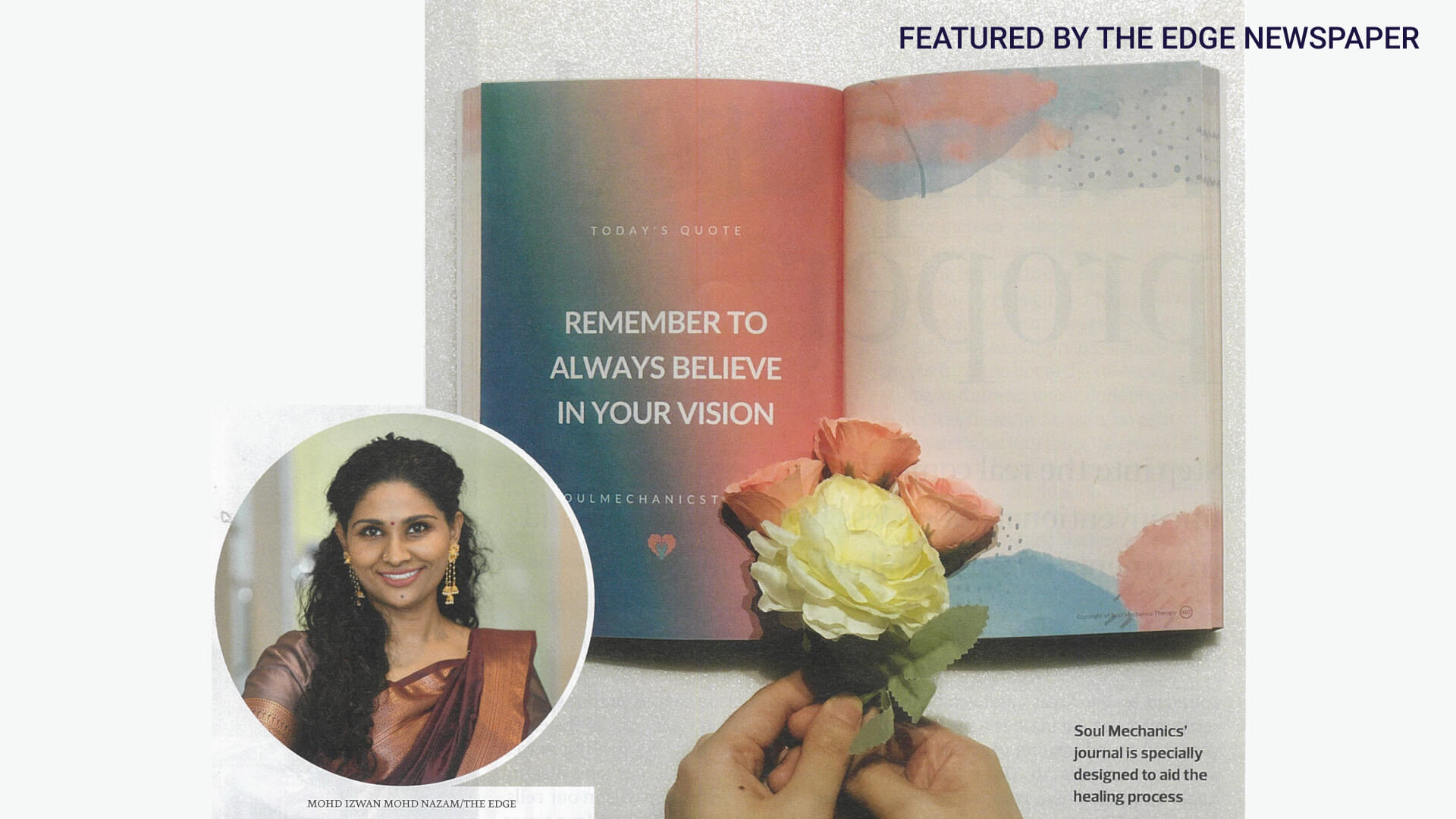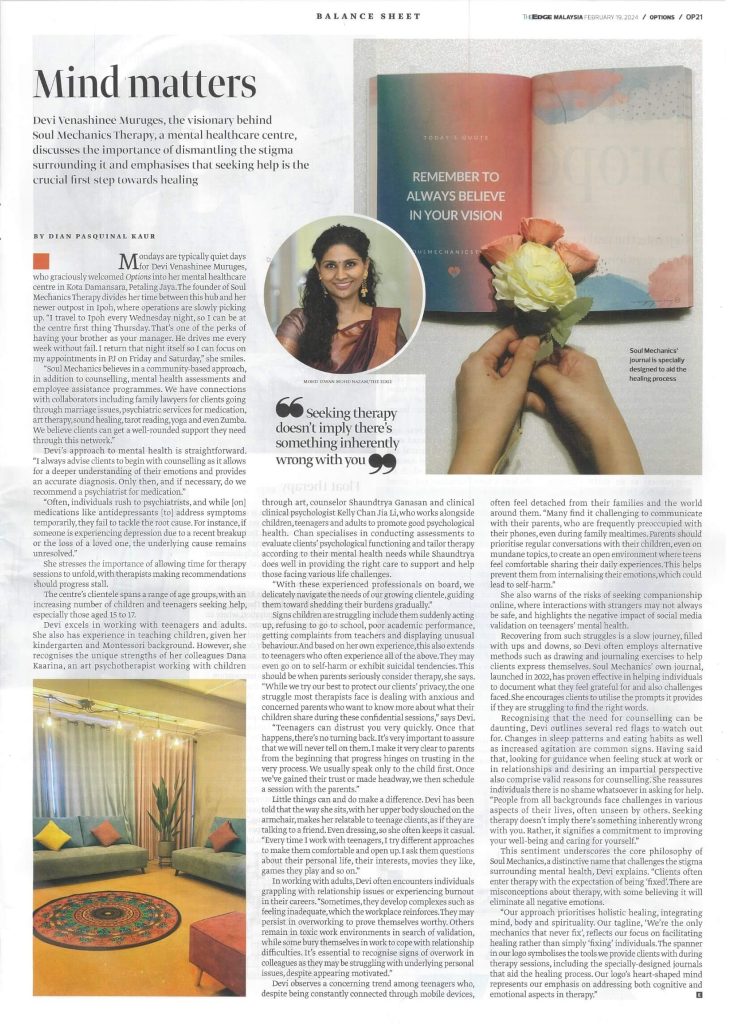Mondays are typically quiet days for Devi Venashinee Muruges, who graciously welcomed Options into her mental healthcare centre in Kota Damansara, Petaling Jaya. The founder of Soul Mechanics Therapy divides her time between this hub and her newer outpost in Ipoh, where operations are slowly picking up. "I travel to Ipoh every Wednesday night, so I can be at the centre first thing Thursday. That's one of the perks of having your brother as your manager. He drives me every week without fail. I return that night itself so I can focus on my appointments in PJ on Friday and Saturday," she smiles.
"Soul Mechanics believes in a community-based approach, in addition to counselling, mental health assessments and employee assistance programmes. We have connections with collaborators including family lawyers for clients going through marriage issues, psychiatric services for medication, art therapy, sound healing, tarot reading, yoga and even Zumba. We believe clients can get a well-rounded support they need through this network."
Devi's approach to mental health is straightforward. "I always advise clients to begin with counselling as it allows for a deeper understanding of their emotions and provides an accurate diagnosis. Only then, and if necessary, do we recommend a psychiatrist for medication."
"Often, individuals rush to psychiatrists, and while [on] medications like antidepressants [to] address symptoms temporarily, they fail to tackle the root cause. For instance, if someone is experiencing depression due to a recent breakup or the loss of a loved one, the underlying cause remains unresolved."
She stresses the importance of allowing time for therapy sessions to unfold, with therapists making recommendations should progress stall.
The centre's clientele spans a range of age groups, with an increasing number of children and teenagers seeking help. especially those aged 15 to 17.
Devi excels in working with teenagers and adults. She also has experience in teaching children, given her kindergarten and Montessori background. However, she recognises the unique strengths of her colleagues Dana Kaarina, an art psychotherapist working with children through art, counselor Shaundtrya Ganasan and clinical psychologist Kelly Chan Jia Li, who works alongside children, teenagers and adults to promote good psychological health. Chan specialises in conducting assessments to evaluate clients' psychological functioning and tailor therapy according to their mental health needs while Shaundtrya does well in providing the right care to support and help those facing various life challenges.

"Seeking therapy doesn't imply there's something inherently wrong with you"
"With these experienced professionals on board, we delicately navigate the needs of our growing clientele, guiding them toward shedding their burdens gradually."
Signs children are struggling include them suddenly acting up, refusing to go to school, poor academic performance, getting complaints from teachers and displaying unusual behaviour. And based on her own experience, this also extends to teenagers who often experience all of the above. They may even go on to self-harm or exhibit suicidal tendencies. This should be when parents seriously consider therapy, she says. "While we try our best to protect our clients' privacy, the one struggle most therapists face is dealing with anxious and concerned parents who want to know more about what their children share during these confidential sessions," says Devi.
"Teenagers can distrust you very quickly. Once that happens, there's no turning back. It's very important to assure that we will never tell on them. I make it very clear to parents from the beginning that progress hinges on trusting in the very process. We usually speak only to the child first. Once we've gained their trust or made headway, we then schedule a session with the parents."
Little things can and do make a difference. Devi has been told that the way she sits, with her upper body slouched on the armchair, makes her relatable to teenage clients, as if they are talking to a friend. Even dressing, so she often keeps it casual. "Every time I work with teenagers, I try different approaches to make them comfortable and open up. I ask them questions about their personal life, their interests, movies they like, games they play and so on."
In working with adults, Devi often encounters individuals grappling with relationship issues or experiencing burnout in their careers. "Sometimes, they develop complexes such as feeling inadequate, which the workplace reinforces. They may persist in overworking to prove themselves worthy. Others remain in toxic work environments in search of validation, while some bury themselves in work to cope with relationship difficulties. It's essential to recognise signs of overwork in colleagues as they may be struggling with underlying personal issues, despite appearing motivated."
Devi observes a concerning trend among teenagers who, despite being constantly connected through mobile devices, often feel detached from their families and the world around them. "Many find it challenging to communicate with their parents, who are frequently preoccupied with their phones, even during family mealtimes. Parents should prioritise regular conversations with their children, even on mundane topics, to create an open environment where teens feel comfortable sharing their daily experiences. This helps prevent them from internalising their emotions, which could lead to self-harm."
She also warns of the risks of seeking companionship online, where interactions with strangers may not always be safe, and highlights the negative impact of social media validation on teenagers' mental health.
Recovering from such struggles is a slow journey, filled with ups and downs, so Devi often employs alternative methods such as drawing and journaling exercises to help clients express themselves. Soul Mechanics' own journal, launched in 2022, has proven effective in helping individuals to document what they feel grateful for and also challenges faced. She encourages clients to utilise the prompts it provides if they are struggling to find the right words.
Recognising that the need for counselling can be daunting, Devi outlines several red flags to watch out for. Changes in sleep patterns and eating habits as well as increased agitation are common signs. Having said that, looking for guidance when feeling stuck at work or in relationships and desiring an impartial perspective also comprise valid reasons for counselling. She reassures individuals there is no shame whatsoever in asking for help. "People from all backgrounds face challenges in various aspects of their lives, often unseen by others. Seeking therapy doesn't imply there's something inherently wrong with you. Rather, it signifies a commitment to improving your well-being and caring for yourself."
This sentiment underscores the core philosophy of Soul Mechanics, a distinctive name that challenges the stigma surrounding mental health, Devi explains. "Clients often enter therapy with the expectation of being 'fixed'. There are misconceptions about therapy, with some believing it will eliminate all negative emotions.
"Our approach prioritises holistic healing, integrating mind, body and spirituality. Our tagline, 'We're the only mechanics that never fix, reflects our focus on facilitating healing rather than simply 'fixing' individuals. The spanner in our logo symbolises the tools we provide clients with during therapy sessions, including the specially designed journals that aid the healing process. Our logo's heart-shaped mind represents our emphasis on addressing both cognitive and emotional aspects in therapy."


